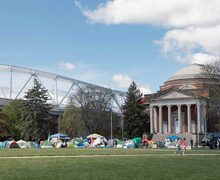Here’s what you need to know about SU’s COVID-19 response strategy
Will Fudge | Staff Photographer
The university will isolate infected students in the Sheraton Hotel.
The Daily Orange is a nonprofit newsroom that receives no funding from Syracuse University. Consider donating today to support our mission.
Syracuse University has spent months developing its plan to test, trace and isolate coronavirus cases on campus in preparation for students’ return to campus this fall.
The university’s Fall 2020 Open Working Group, led by Vice Chancellor Mike Haynie, has created plans this summer to ensure a safe return to campus in August. Extensive testing and contact tracing procedures are among the public health and safety measures included in SU’s plans.
With classes set to resume next week, here’s a rundown of what you need to know about SU’s COVID-19 response strategy:
How is SU monitoring for COVID-19 on campus?
Students must receive a COVID-19 test before arriving on campus and submit a negative result to the university within 10 days of their move-in date. To gain card-swipe access to campus facilities, students must verify at South Campus’ Skytop Parking Lot that they completed the pre-arrival test before moving in.
The university will then test all students upon arrival using pooled saliva testing. Saliva samples will be tested in groups, or “pools,” of 20 to 25 based on the students’ housing assignments both on and off campus. SU will conduct a second round of the testing two weeks later and will continue to test throughout the semester.
“We are going to do (testing) periodically at various intervals,” said Joe Hernon, director of emergency management and business continuity, at a virtual forum Friday. “(We are) making sure we’re hitting the various community groups on campus, that way we have an understanding of where the virus is.”
If a pool tests positive, the Barnes Center at The Arch will immediately administer rapid tests to all individuals in that pool to identify any COVID-19 infections.
MORE FROM ORIENTATION GUIDE 2020:
- SU to offer online mental health services this fall
- University Union, Syracuse music venues implement alternate concert formats
- SU Greek life during COVID-19: No parties, social events at chapter houses
- What to know about the constantly changing status of Syracuse fall sports
The university will also test the wastewater of residence halls, academic buildings and surrounding neighborhoods twice a week to monitor for traces of COVID-19. COVID-19 can be found in wastewater up to 10 days before an individual begins to show symptoms.
“If there is the presence of (COVID-19) in any of those facilities, that would again trigger us to subsequently do diagnostic, individual-level testing, of all the occupants of a given building,” Haynie said at a virtual forum Aug. 7.
To ensure the efficacy of wastewater testing, the university will not allow students to bring visitors into their dorms during the semester. It is unclear exactly how the university will proceed if it finds traces of COVID-19 in the wastewater of an academic building or one of SU’s surrounding neighborhoods.
What happens if an SU student or employee contracts COVID-19?
If a student tests positive for COVID-19, the university will relocate them to isolation housing at the university-owned Sheraton Hotel. Students must isolate for at least 10 days and until they’re symptom-free for 24 hours without medication.
The university’s contact tracers will also communicate with the student to identify any individuals who they may have exposed to the virus.
Students in isolation will receive a case manager to help them with their academic and physical needs. Those isolating can also share spaces with other individuals who have contracted the virus.
If a faculty or staff member contracts the virus, they will isolate at home while working with SU’s contact tracing team. Employees with mild symptoms should continue to work from home, if possible, said Cole Smith, dean of the College of Engineering and Computer Science and a member of the Open Working Group.
The university is still developing plans for continuing classes if an instructor has severe symptoms, he said.
“We might have another instructor take over,” Smith said. “Or, we just simply postpone classes while the instructor recovers, and make them up later by video, which is a common recourse action when someone is sick in normal years.”
The university’s COVID-19 dashboard, which SU updates every Tuesday by 5 p.m., will track the number of SU students and employees who have contracted the virus.
What happens to the contacts of someone who tests positive?
The university’s contact tracing team will notify close contacts of infected individuals by phone and through their SU email account. The contacts will then relocate to the Sheraton to quarantine for 14 days, where they will self-monitor for symptoms.
Close contacts include anyone who’s come within six feet of an infected person for more than 15 minutes, Hernon said.
“If you’re in that space and you haven’t had a mask on, or you did not socially distance, that is where those variables become gray, and you could be considered a close contact,” Hernon said.
Individuals exposed to the virus will also have a case manager while in quarantine. While in quarantine, students will have their own room and bathroom and will not interact with any other individuals who are quarantining.
Published on August 16, 2020 at 5:35 pm
Contact Mira: [email protected]





